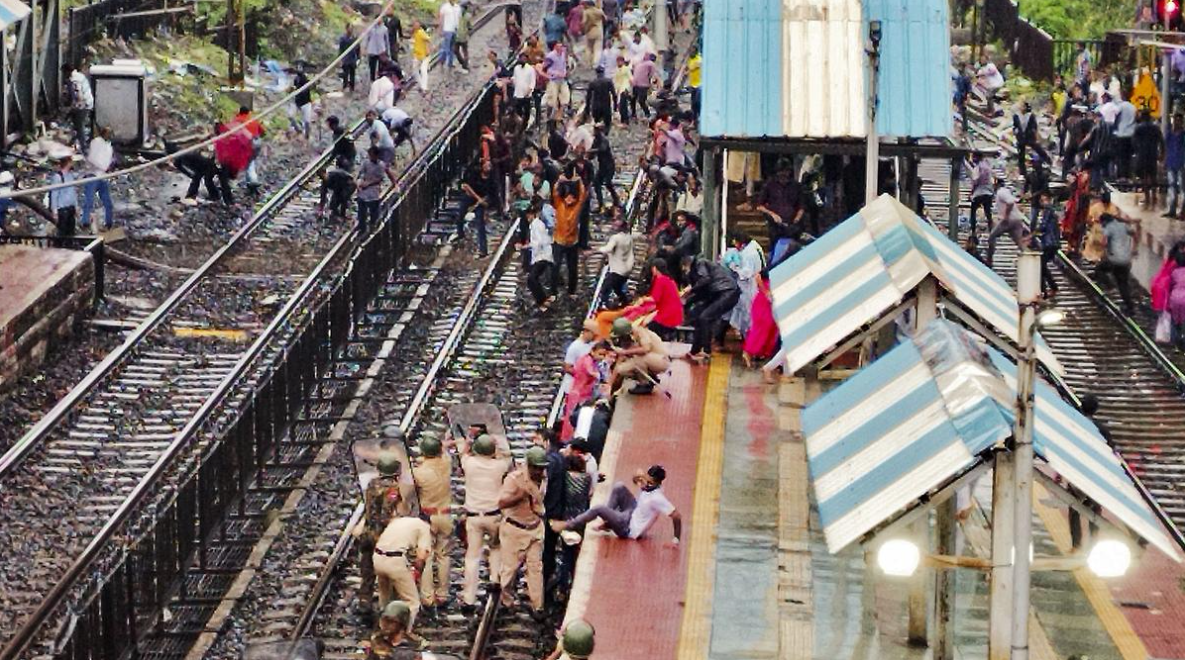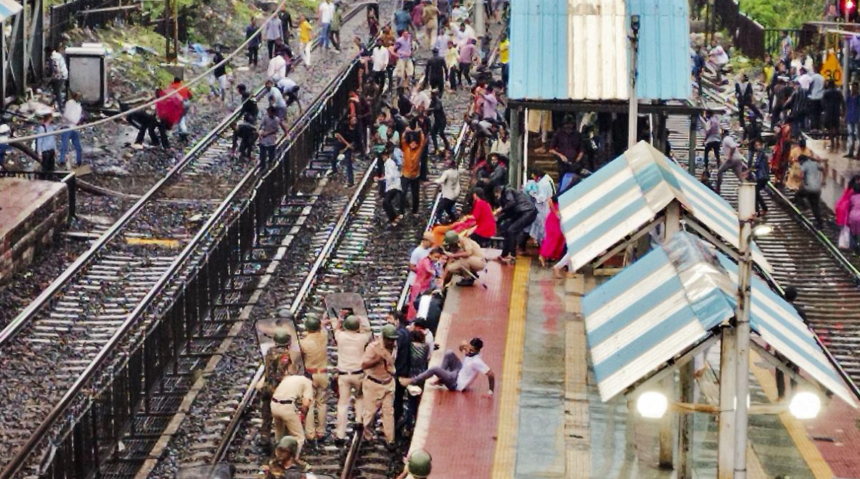Introduction
Badlapur Sexual Assault:- The town of Badlapur in Maharashtra has been shaken by a heinous crime that has sparked widespread outrage and led to large-scale protests. The sexual assault case, which has garnered national attention, involves the brutal rape of a young woman, leading to the arrest of the accused on August 17, 2024. The incident has ignited anger and frustration among residents, leading to mass protests and clashes with the police. As a result, FIRs have been filed against at least 300 protesters, with 72 people arrested so far. This article delves into the details of the case, the public response, the actions taken by the authorities, and the broader implications of such incidents on society.
The Incident: A Shocking Crime
The sexual assault case that has brought Badlapur to the forefront of national news occurred on the night of August 16, 2024. According to police reports, a young woman was brutally assaulted by a man who lured her into an isolated area under false pretenses. The victim was found unconscious and severely injured by passersby, who immediately informed the authorities. She was rushed to a nearby hospital, where she remains in critical condition.
The accused, a local resident with a history of criminal behavior, was apprehended the following day, on August 17, after an intensive manhunt. He was produced before a magistrate at Kalyan and has been remanded to police custody for five days, until August 26. The brutality of the crime has shocked the nation, and the incident has once again highlighted the pervasive issue of sexual violence in India.
Public Outrage and Protests
The news of the assault spread quickly, leading to widespread anger among the residents of Badlapur and surrounding areas. The local community, already grappling with issues of safety and law enforcement, erupted in protests demanding justice for the victim and harsher punishment for the accused. The protests, which began as peaceful demonstrations, soon escalated as frustration mounted over the perceived slow response from the authorities.
By August 18, thousands of people had taken to the streets, blocking roads, and demanding immediate action. The protesters, including members of various social organizations and women’s rights groups, called for swift justice and measures to prevent such incidents in the future. They also expressed their dissatisfaction with the police and local administration, accusing them of negligence and inefficiency.
Clashes with Police and Legal Actions
As the protests grew in intensity, clashes between the protesters and the police became inevitable. On August 19, the situation turned violent when a group of protesters attempted to storm the police station where the accused was being held. The police responded with force, using batons and tear gas to disperse the crowd. Several protesters were injured in the clashes, and the police detained dozens of individuals for inciting violence.
The authorities have since filed First Information Reports (FIRs) against at least 300 protesters, charging them with offenses ranging from unlawful assembly to rioting and assault on public servants. So far, 72 people have been arrested in connection with the protests. The police have also imposed Section 144 of the Criminal Procedure Code, which prohibits the assembly of more than four people in the area, in an attempt to prevent further unrest. 
The arrests and FIRs have further fueled public anger, with many accusing the authorities of using heavy-handed tactics to suppress dissent. Human rights activists and opposition political parties have condemned the police action, arguing that the government’s response to the protests is a reflection of its failure to address the root causes of violence against women.
The Legal Battle: Seeking Justice
The legal proceedings in the Badlapur sexual assault case are being closely monitored by both the public and media. The accused, who has been remanded in police custody, is facing charges under several sections of the Indian Penal Code, including rape, attempted murder, and assault. The police have assured the public that they are conducting a thorough investigation and are committed to securing a conviction.
Given the high-profile nature of the case, there is significant pressure on the judicial system to deliver swift justice. The victim’s family, supported by legal experts and activists, is pushing for a fast-track trial to ensure that the case is resolved quickly. They are also advocating for the maximum possible punishment for the accused, calling for the death penalty as a deterrent to future crimes.
The case has also prompted calls for broader legal reforms, including the introduction of stricter penalties for sexual offenses and measures to ensure the safety of women in public spaces. Advocates for women’s rights argue that while legal action against individual perpetrators is crucial, it must be accompanied by systemic changes to address the underlying issues of gender-based violence and inequality.
The Broader Implications: Gender Violence in India
The Badlapur sexual assault case is not an isolated incident but rather a reflection of the broader issue of gender violence in India. Despite various legal and policy measures aimed at protecting women, sexual violence remains a pervasive problem in the country. According to the National Crime Records Bureau (NCRB), thousands of rape cases are reported every year, with many more going unreported due to social stigma and fear of retribution.
The case has reignited the debate over the effectiveness of existing laws and the need for more comprehensive measures to prevent sexual violence. Activists and experts argue that addressing gender violence requires a multifaceted approach that includes legal reforms, education, and changes in societal attitudes towards women. They emphasize the importance of early intervention, public awareness campaigns, and community-based initiatives to combat the culture of violence and misogyny.
The Role of Law Enforcement
The role of law enforcement agencies in addressing sexual violence has come under scrutiny in the wake of the Badlapur case. Critics argue that the police often fail to respond adequately to reports of sexual violence, either due to a lack of resources or because of deeply ingrained biases. The failure to act promptly can result in further harm to victims and contribute to a sense of impunity among perpetrators.
Reforming law enforcement practices is seen as a critical step in improving the response to sexual violence. This includes training police officers to handle cases of sexual assault with sensitivity, ensuring that investigations are conducted thoroughly and without delay, and holding officers accountable for any lapses in duty. Moreover, there is a need for greater coordination between law enforcement agencies, the judiciary, and social services to provide comprehensive support to victims.
The Need for Societal Change
Beyond legal and law enforcement reforms, there is a growing recognition that addressing gender violence requires a fundamental shift in societal attitudes towards women. In many parts of India, deeply rooted patriarchal norms continue to perpetuate gender inequality and violence against women. Challenging these norms requires sustained efforts to promote gender equality, empower women, and change harmful cultural practices.
Education plays a vital role in this process. By promoting gender equality and respect for women’s rights from an early age, society can begin to dismantle the structures that allow gender violence to persist. Public awareness campaigns, community engagement, and the involvement of men and boys in efforts to combat gender violence are also crucial components of a broader strategy to create a safer and more just society.
Supporting Survivors
In the aftermath of incidents like the Badlapur sexual assault, it is essential to provide support to survivors and their families. This includes access to medical care, psychological counseling, legal assistance, and protection from further harm. Ensuring that survivors receive the support they need to rebuild their lives is a critical aspect of the response to sexual violence.
There is also a need to address the social stigma that often surrounds survivors of sexual violence. In many cases, survivors face ostracism, discrimination, and victim-blaming, which can compound the trauma they have experienced. Efforts to support survivors must include initiatives to challenge these attitudes and promote a culture of empathy, understanding, and respect.
Conclusion
The Badlapur sexual assault case is a tragic reminder of the ongoing issue of gender violence in India. The public outrage and protests that followed the incident reflect the deep frustration and anger that many feel about the continued prevalence of such crimes. While the legal proceedings in the case are still unfolding, the broader implications are clear: there is an urgent need for comprehensive measures to address sexual violence and protect the rights of women.
This includes not only legal and law enforcement reforms but also efforts to challenge the societal norms that perpetuate gender inequality and violence. As the country continues to grapple with these issues, it is essential that all stakeholders—government, law enforcement, civil society, and the public—work together to create a safer and more just society for all.
The case of Badlapur, like many others, highlights the importance of sustained efforts to combat gender violence, support survivors, and ensure that justice is served. Only through collective action and a commitment to change can we hope to end the scourge of sexual violence and build a future where every woman can live free from fear. ALSO READ:- Sheikh Hasina Faces 33 Cases, Including Murder Charges, After Ouster from Bangladesh: A Complex Political Battle





